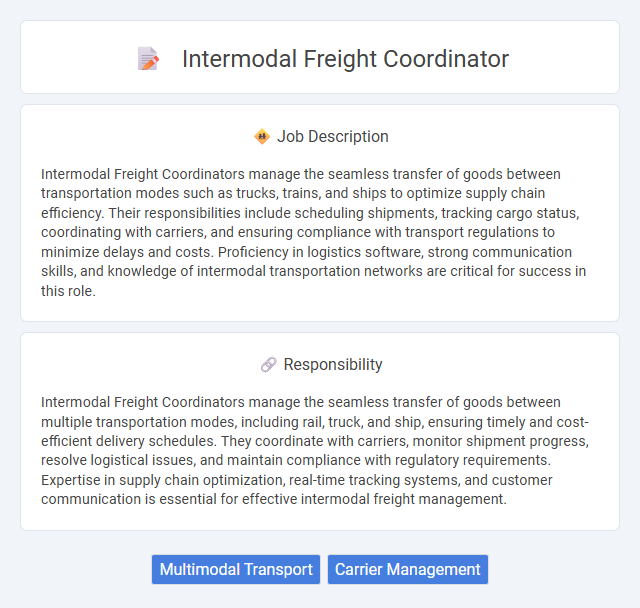
Intermodal Freight Coordinators manage the seamless transfer of goods between transportation modes such as trucks, trains, and ships to optimize supply chain efficiency. Their responsibilities include scheduling shipments, tracking cargo status, coordinating with carriers, and ensuring compliance with transport regulations to minimize delays and costs. Proficiency in logistics software, strong communication skills, and knowledge of intermodal transportation networks are critical for success in this role.
People who thrive as Intermodal Freight Coordinators are likely to possess strong organizational skills, attention to detail, and the ability to multitask under pressure. Candidates comfortable with fast-paced environments and complex logistics coordination may be especially well-suited for this role. Individuals who prefer routine tasks or struggle with dynamic problem-solving might find this position less compatible with their strengths.
Qualification
An Intermodal Freight Coordinator requires expertise in logistics management, transportation planning, and supply chain coordination, often with a background in business or logistics. Proficiency in freight tracking software, strong communication skills, and knowledge of intermodal equipment and regulations are essential. A minimum of a bachelor's degree in logistics, supply chain management, or a related field and relevant industry certifications such as Certified Supply Chain Professional (CSCP) enhance job prospects.
Responsibility
Intermodal Freight Coordinators manage the seamless transfer of goods between multiple transportation modes, including rail, truck, and ship, ensuring timely and cost-efficient delivery schedules. They coordinate with carriers, monitor shipment progress, resolve logistical issues, and maintain compliance with regulatory requirements. Expertise in supply chain optimization, real-time tracking systems, and customer communication is essential for effective intermodal freight management.
Benefit
Intermodal Freight Coordinator roles likely offer substantial benefits including enhanced career growth opportunities due to the increasing demand for efficient supply chain management. This position may provide competitive salaries and comprehensive health benefits reflecting the critical nature of the job. There is also a probability of gaining valuable experience through coordination across multiple transportation modes, which can improve overall industry knowledge and job security.
Challenge
Intermodal Freight Coordinator roles likely present challenges in managing complex logistics across multiple transportation modes, requiring precise coordination to prevent delays and optimize efficiency. Handling unexpected disruptions such as weather issues or equipment shortages probably demands quick problem-solving and adaptability. Balancing customer demands with operational constraints may involve continuous negotiation and prioritization to maintain seamless freight flow.
Career Advancement
Intermodal Freight Coordinators play a critical role in managing the seamless transfer of goods across various transportation modes, requiring expertise in logistics, supply chain management, and regulatory compliance. Career advancement opportunities often lead to positions such as Logistics Manager, Supply Chain Analyst, or Operations Director, with increased responsibilities in strategic planning and team leadership. Gaining certifications like Certified Supply Chain Professional (CSCP) or Certified in Logistics, Transportation and Distribution (CLTD) enhances prospects for higher-level roles in the freight and transportation industry.
Key Terms
Multimodal Transport
Intermodal Freight Coordinators manage the seamless movement of goods using multimodal transport, integrating road, rail, sea, and air to optimize efficiency and reduce costs. They coordinate schedules, monitor cargo transfers, and ensure compliance with international shipping regulations to maintain supply chain continuity. Expertise in logistics software and knowledge of customs procedures are critical for successful multimodal freight coordination.
Carrier Management
An Intermodal Freight Coordinator specializing in Carrier Management optimizes transportation logistics by selecting and managing multiple carriers across rail, truck, and sea to ensure timely and cost-effective freight movement. This role involves negotiating contracts, monitoring carrier performance, and resolving service issues to maintain strong partnerships and compliance with regulatory standards. Utilizing advanced software platforms and real-time data analytics enhances route planning, load optimization, and carrier capacity utilization, driving operational efficiency in supply chain management.
 kuljobs.com
kuljobs.com